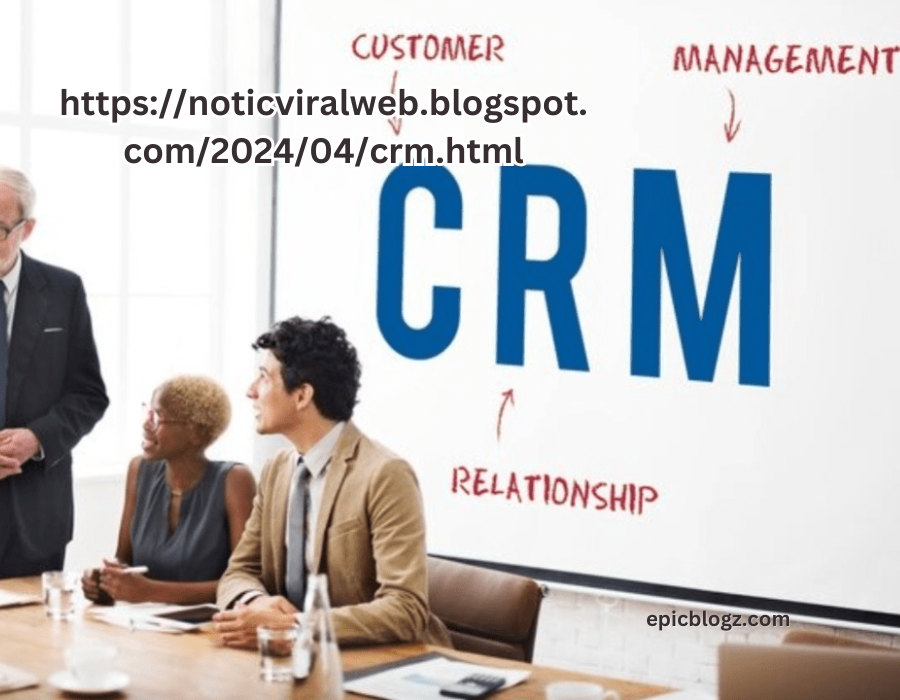Introduction: https://noticviralweb.blogspot.com/2024/04/crm.html
In today’s fast-paced, technology-driven business landscape, effective customer relationship management (CRM) has become a critical component of success. CRM systems (https://noticviralweb.blogspot.com/2024/04/crm.html) have evolved from simple contact management tools to sophisticated platforms that enable organizations to streamline their operations. Enhance customer engagement, and drive growth.
Understanding CRM
https://noticviralweb.blogspot.com/2024/04/crm.html is a strategy and a set of technologies that enable organizations to manage their interactions with customers and potential customers. It encompasses a wide range of processes, including lead generation, sales management, customer service, and marketing automation. By centralizing customer data and providing a unified view of the customer journey. CRM systems help businesses deliver a more personalized and efficient customer experience.
Key Components of a CRM System
- Contact Management: CRM systems store and organize customer information, such as contact details, communication history, and purchase records. Making it easier for teams to access and share this data.
- Lead and Opportunity Management: CRM tools help businesses track and manage leads, from initial contact to conversion. Allowing sales teams to focus on the most promising opportunities.
- Sales Force Automation: CRM systems automate repetitive sales tasks, such as lead assignment, email tracking, and pipeline management, freeing up sales representatives to focus on building relationships and closing deals.
- Marketing Automation: CRM platforms integrate with marketing tools to help businesses create targeted campaigns, track customer engagement, and measure the effectiveness of their marketing efforts.
- Customer Service and Support: CRM systems provide a centralized platform for managing customer inquiries, complaints, and support requests. Enabling businesses to deliver a consistent and efficient customer experience.
- Analytics and Reporting: CRM systems offer robust analytics and reporting features that allow businesses to measure performance, track customer behavior, and identify trends, enabling data-driven decision-making.
Benefits of CRM
- Improved Customer Satisfaction: By providing a 360-degree view of the customer, CRM systems (https://noticviralweb.blogspot.com/2024/04/crm.html) enable businesses to deliver personalized and responsive service, leading to higher customer satisfaction and loyalty.
- Increased Sales Efficiency: CRM tools automate repetitive sales tasks, provide real-time insights into the sales pipeline, and help sales teams prioritize their efforts. Resulting in more efficient and effective sales processes.
- Enhanced Marketing Effectiveness: CRM platforms integrate with marketing tools to help businesses create targeted campaigns, track customer engagement. Moreover, measure the effectiveness of their marketing efforts, leading to better ROI on marketing investments.
- Streamlined Operations: By centralizing customer data and automating key processes. CRM systems help businesses reduce manual tasks, minimize errors, and improve overall operational efficiency.
- Data-Driven Decision Making: CRM platforms provide businesses with valuable insights into customer behavior, preferences, and trends. Enabling them to make data-driven decisions that drive growth and innovation.
CRM Trends and Future Developments
- Artificial Intelligence (AI) and Machine Learning: AI-powered CRM systems (https://noticviralweb.blogspot.com/2024/04/crm.html) are becoming increasingly prevalent, enabling businesses to automate tasks, personalize interactions, and gain deeper insights into customer behavior.
- Mobile CRM: With the rise of remote work and the increasing use of mobile devices, mobile CRM solutions are becoming more important. Furthermore, allowing sales teams to access customer data and perform key tasks on-the-go.
- Social CRM: Businesses are integrating social media platforms into their CRM strategies to engage with customers, monitor brand sentiment, and gather valuable customer insights.
- Omnichannel Customer Experience: CRM systems are evolving to support a seamless, consistent customer experience across multiple channels, from in-person interactions to online and mobile touchpoints.
- Cloud-Based CRM: Cloud-based CRM solutions are becoming more popular due to their scalability, flexibility, and lower upfront costs, making them accessible to businesses of all sizes.
Implementing CRM Successfully
Successful CRM(https://noticviralweb.blogspot.com/2024/04/crm.html) implementation requires a well-planned strategy, executive buy-in, and a focus on change management. Key steps include:
- Defining Clear Goals and Objectives: Businesses should clearly define what they hope to achieve with CRM and align it with their overall business strategy.
- Selecting the Right CRM Solution: Businesses should carefully evaluate CRM vendors and choose a solution that best fits their needs, budget, and existing infrastructure.
- Ensuring Data Quality: Businesses should prioritize data cleanliness and accuracy, as poor data quality can undermine the effectiveness of the CRM system.
- Training and Supporting Users: Businesses should provide comprehensive training and ongoing support to ensure that employees are comfortable using the CRM system and understand its benefits.
- Measuring and Optimizing Performance: Businesses should regularly monitor the performance of their CRM system and make adjustments as needed to ensure that it continues to deliver value over time.
How to Optimize CRM Components for Success
- Understand Your Customer Journey: Before diving into assessing features and CRM technology, take time to map out your typical customer journey. Identify all touchpoints of your customer base where CRM components can enhance customer engagement. Consider how contact management can provide personalized experiences or how marketing automation aligns with your customer’s buying stages.
- Engage Your Team: A CRM system affects teams across your organization, so it’s crucial to include key stakeholders and team members in the evaluation process. Gather insights from sales, marketing, customer service, and other relevant departments. Understand their specific requirements, processes, and workflows, and how different CRM components can support their daily operations.
- Test Usability and Functionality: Request demos or trial versions of CRM systems. This step allows you and your team to get hands-on experience with the different components. Evaluate how intuitive and effective each component is. Can your team easily navigate through the sales workflow automation feature? Is the reporting tool customizable to the specific needs of your marketing team? Also, consider how easily the system can integrate with your existing tools and software. Furthermore, The usability and functionality of each component should support your business processes, not complicate them.
- Analyze Data Handling and Security: Ensure that the CRM system you choose complies with data protection regulations and has robust security measures in place. This is crucial for maintaining customer trust and safeguarding sensitive information.
- Regularly Review and Update: The business landscape is constantly changing, and so are customer needs. Regularly review your CRM system’s performance and update it as necessary to ensure it continues to meet your evolving business requirements.
Conclusion
CRM(https://noticviralweb.blogspot.com/2024/04/crm.html) has become an essential tool for businesses looking to thrive in the digital age. By centralizing customer data, automating key processes, and enabling personalized interactions. Furthermore, CRM systems help organizations build stronger, more profitable relationships with their customers. As technology continues to evolve, the role of CRM in driving business success will only become more critical. By embracing CRM and staying ahead of the curve, businesses can position themselves for long-term growth and success in an increasingly competitive marketplace.
FAQs
What is CRM, and why is it important?
CRM is a strategy and a set of technologies that enable organizations to manage their interactions with customers and potential customers. It is important because it helps businesses deliver a more personalized and efficient customer experience. Furthermore, leading to higher customer satisfaction, loyalty, and growth.
What are the key components of a CRM system?
The key components of a CRM system include contact management, lead and opportunity management, sales force automation. Furthermore, marketing automation, customer service and support, and analytics and reporting.
What are the benefits of implementing a CRM system?
The benefits of implementing a CRM system include improved customer satisfaction, increased sales efficiency. Furthermore, enhanced marketing effectiveness, streamlined operations, and data-driven decision-making.
What are some of the latest trends in CRM?
Some of the latest trends in CRM include the use of artificial intelligence and machine learning, mobile CRM, social CRM, omnichannel customer experience, and cloud-based CRM solutions.
How can businesses ensure successful CRM implementation?
Businesses can ensure successful CRM implementation by defining clear goals and objectives, selecting the right CRM solution, ensuring data quality, training and supporting users. Furthermore, regularly measuring and optimizing performance.







